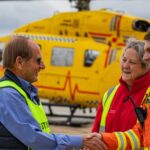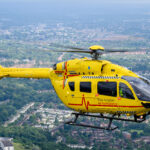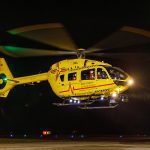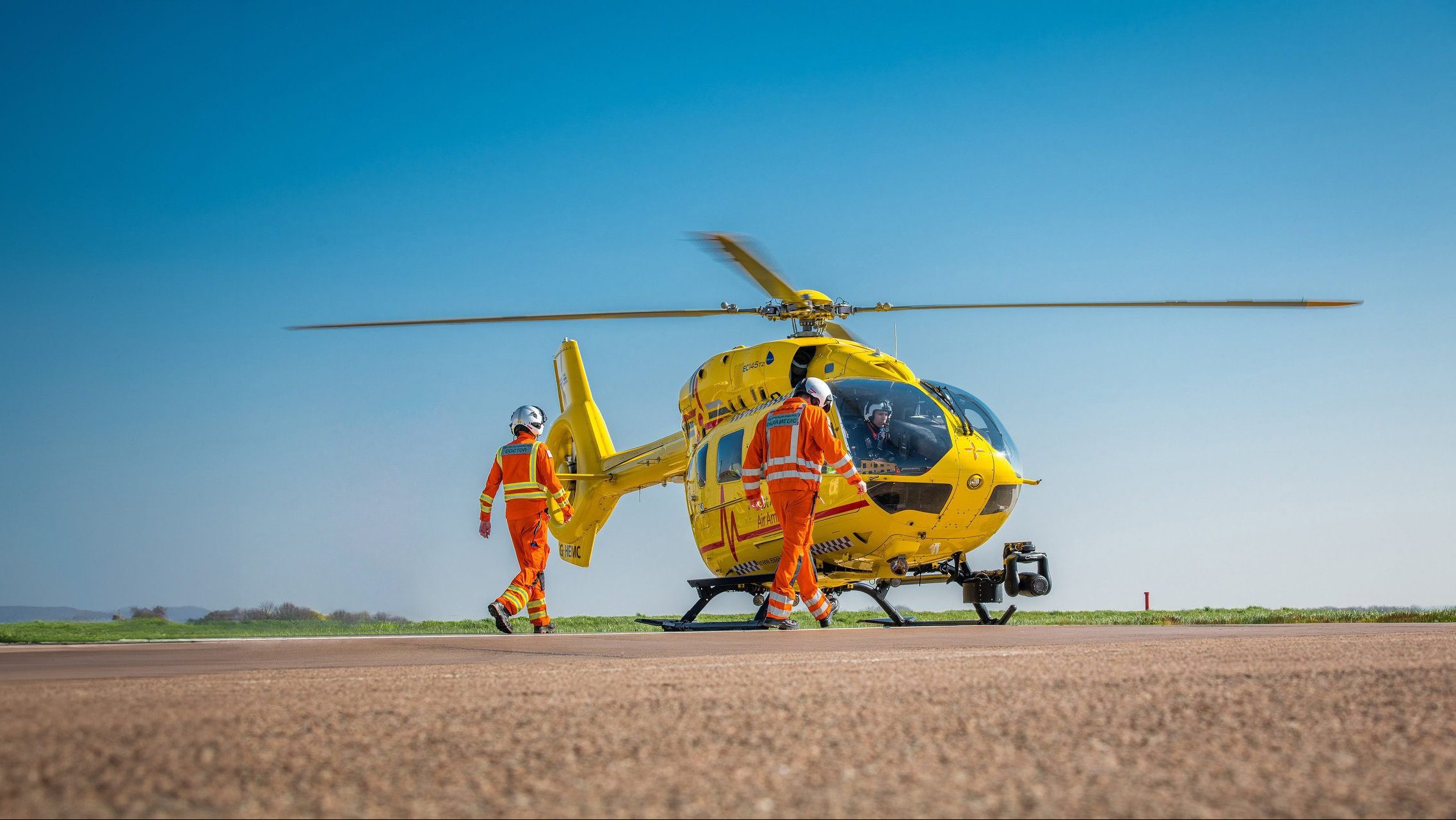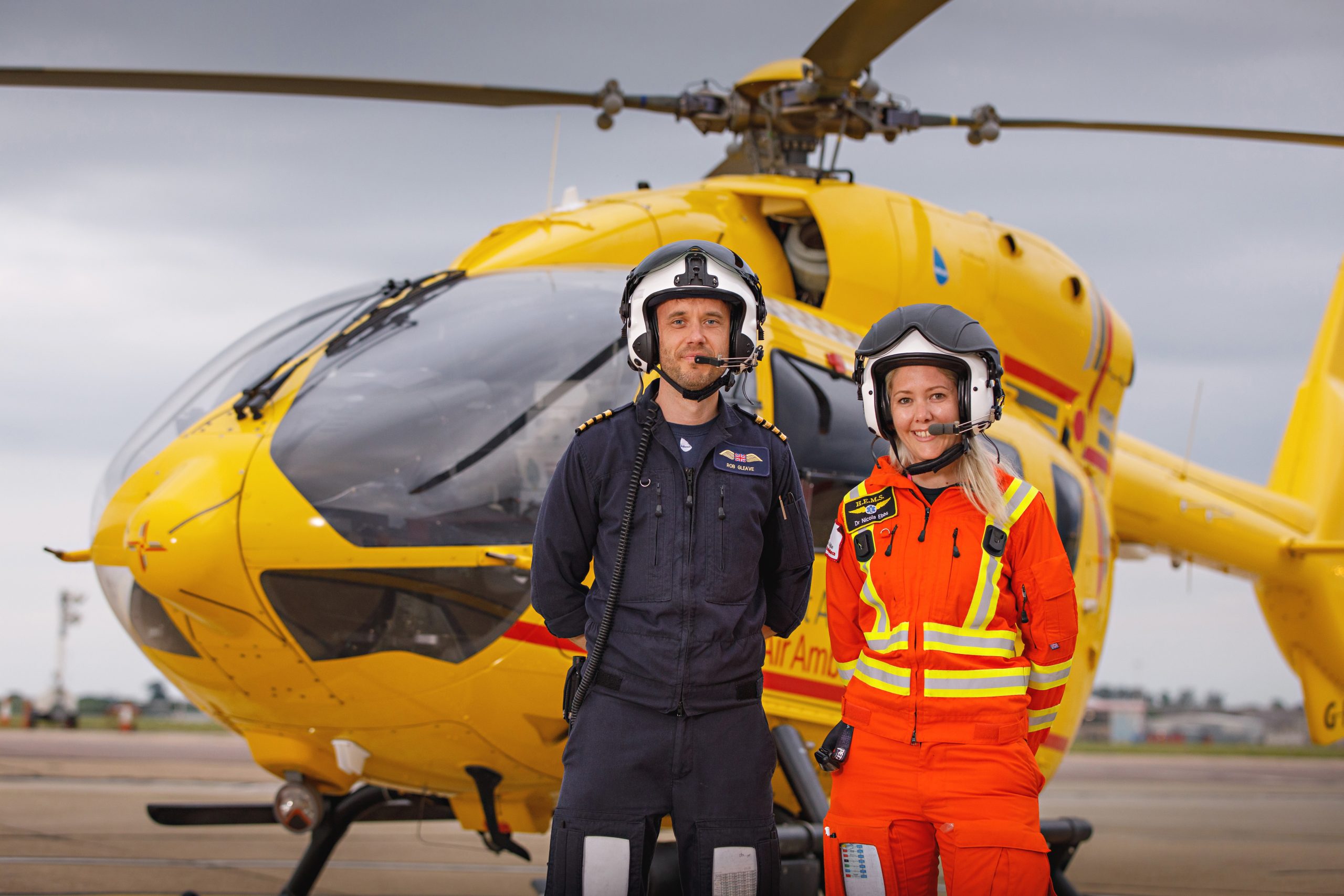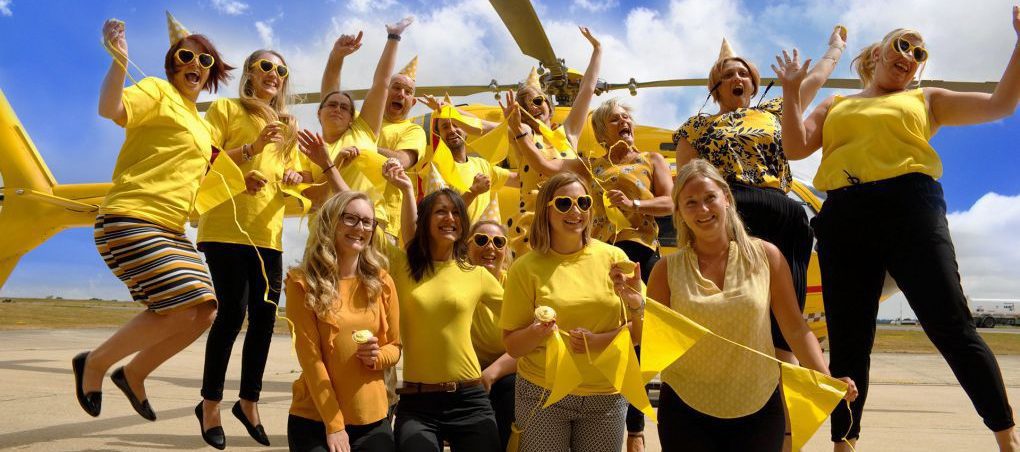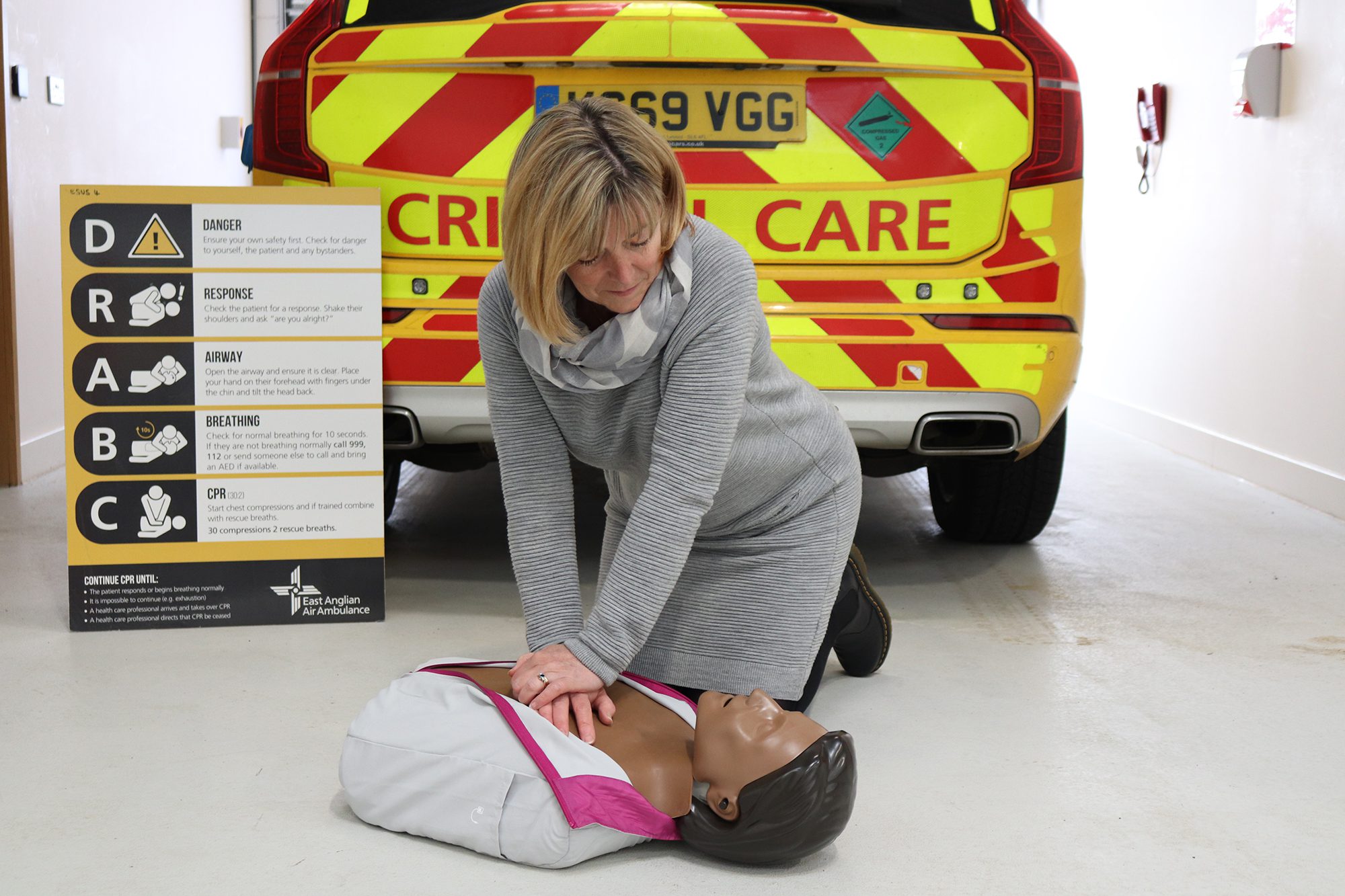4 Jun 2020
Frontline insights from our HEMS crew
Adapting to Covid-19 while delivering a helicopter emergency medical service (HEMS) for East Anglia. As Covid-19 took over our ambulance service and our hospitals, we knew people wouldn't stop having cardiac arrests, medical emergencies, injuries and road traffic collisions. There was still a need for both of our helicopters to keep flying and responding to 999 calls, but we had to adapt very quickly in order to keep our crews safe.
Every aspect of our operation had to be reviewed, trouble-shooted and new procedures put in place to protect our pilots, doctors and paramedics, in order to maintain our normal HEMS service. We would have to assume that every patient we went to could be infected with the virus and take the necessary precautions.
Sourcing and financing large amounts of unbudgeted personal protective equipment (PPE) and making sure that our crews were trained in wearing and operating in this PPE, was a huge but essential task.
Early on we implemented a ‘cold, hot and warm zone’ operating procedure whilst at scene. This, alongside the essential PPE required, enabled our crews to work safely in the pre-hospital environment.
Our crews now have a lot more to think about while on scene as they must try to limit the contamination of equipment and make sure they have the right level of PPE depending on the situation.
Read what it’s like to be on the frontline during the Covid-19 pandemic through the eyes of our HEMS crew:
Doctor Rishi Rallan
The recent changes to how our operations work has presented more than just a few challenges along the way. Working in PPE has presented challenges such as communication between team members, steaming up goggles just before you are doing critical procedures, as well as making phone calls to hospitals. One of the hardest things about working in PPE I have personally found is communicating with sick patients/family members, trying to convey messages of how unwell their family member is. Dressed in PPE, they cannot see my compassion or natural facial expression during these (already!) difficult conversations and that’s been really hard.
One of the most important parts of PPE wearing is the ‘doffing’ and it really is a test going to a variety of hospitals, each of which have slightly different methods of entering/exiting, as well as different doffing station setups and areas. We are finding that we have to adapt quickly to be as safe as possible.
Despite all this there is nowhere I would rather be working at the moment. Feeling safe at work was something I previously took for granted, and it is a testament to our supporters who kindly have and continue to donate, keeping us all incredibly safe and allowing us to carry out our jobs as close to ‘normal’ as possible.
The mood around the base is always upbeat and there is a real feeling of comradery amongst all the staff who are currently involved in working. I think the discussions we are all having have brought us even closer as a team than before, being even more meticulous about each other’s welfare.
Overall, despite the challenges – the new learning curves, the regular feedback from jobs, the public support, as well as the teams willingness to constantly improve is something I personally feel proud to be a part of and has made what could have been a very downbeat time, an extremely positive and inspirational time to be working with EAAA.
HEMS Paramedic Liam Sagi (photo taken before Covid-19)
Working for East Anglian Air Ambulance over the last few months has been an unusual experience to say the least. There have been some big changes in a short space of time that we have all had to adapt to. All of you will have seen that we are now having to attend and treat patients in personal protective equipment (PPE). This has been a real challenge but one we have all adapted to. Working in PPE is especially difficult for our role because we are often in less than ideal environments providing care to really unwell or injured patients, where time is critical. In addition, trying to have a conversation when you are wearing full PPE is insanely hard!
We have also been helping the region by undertaking transfers of Covid-19 patients from one ITU to another ITU. These patients are often very sick and transfers take around 5-6 hours in total. Given that this a bit of a change to how we normally operate, there has been a lot to learn and mould to help support this new part of our job.
Despite all this, it has been truly, truly humbling to see the support of you, the public. If not every week when the nation has come together to show their appreciation, then with constant “thank yous” and gifts of gratitude. It has been exceptional and even emotional at times to see the solidarity and care we are showing one another. I think we will all be pleased when we come out the other side of this, but the battle is not over yet, so please keep being careful.
Dave Killingback, Critical Care Paramedic
Adjusting to working in PPE has been one of the biggest challenges for me, as it has been for the whole team. The PPE we need varies depending on the risk and procedure required, from a simple surgical mask, gloves and apron to full boiler suits, powered air respirator hoods, shoe covers and three pairs of gloves. This can delay us entering the scene of an emergency, however with regular training and practice all crews have gotten used to the process. With some of the transfers that we have undertaken of confirmed cases of Covid-19, we have remained in PPE for sometimes in the region of four hours, which can be hard work without the ability to take on fluids or visit the bathroom if required!
However, it has also been amazing to see the positive aspects shine through. The teamwork throughout the charity in the rapidly evolving situation has been phenomenal. From the regular activities and quiz’s posted by charity staff working from home, to keep morale up, to the operations team who have managed to source a massive amount of PPE from various sources, including sanitizing alcohol hand gel from a local gin distillery which was made and then donated, a greatly appreciated, example of diversification in the current situation.
We have also been lucky enough to receive donations of food, Easter eggs, ice cream, energy bars and smoothies from local companies. It’s all been extremely kind and has been my personal highlight, but has also meant that a 5k fitness leader board has been needed amongst the team to help us keep in shape!
Doctor Chris Chadwick
When I started my HEMS fellowship with EAAA, certain clinical scenarios and presentations could be anticipated – and following some of the best training in my career, I felt ready to be deployed as part of the clinical crew, with a supportive and caring management and operations structure behind me. I think it’s fair to say a global viral pandemic was not something any of us expected!
It’s definitely true to say we are a sum of our parts. I am really excited to have been part of a team that has really engaged and tackled every angle of this crisis. Our mettle has definitely been tested. Working alongside some genuinely awesome intellects, and nationally eminent clinicians has been inspiring. Combined with an operations team that has delivered quality assured projects which were seemingly impossible in such short timescales is a real testament to the calibre and attitude of the people working here. I have enjoyed extending my skills in many areas such as specialist equipment procurement and policy development and collaborative inter-agency working.
Clinically, we have had to find a new way of ensuring we deliver the highest quality care that we are rightfully proud of, but in personal protective equipment, or by providing advice and support over the phone. As healthcare professionals, we are trained to deal with a patient in front of us. Some of the expert care we have provided during this crisis has been in the unfamiliar telemedicine specialty. In my non clinical time, I have been one of many EAAA clinicians rapidly seconded to partner NHS organisations to support the national response. I have been based at Yorkshire Ambulance Service NHS trust headquarters in the senior clinical support cell (my home ambulance trust). A huge thank you to our HR team for making this happen, I have never seen such efficiency!
I have been really impressed at how the organisation has trusted and valued our contributions as #TogetherWe have sought solutions for unprecedented challenges. It would be easy to just focus on delivering operationally critical issues, but when some of us have been away from our own families, the core values of this incredible organisation and its people have underpinned the whole process and kept us cheered, safe, healthy and engaged on a personal level too. (I never thought I would have done yoga on a video conference!)
We have an incredible team here that care so deeply about providing the very best care for our patients and has very obviously started with our own staff – who are now much more than colleagues. It has been humbling to see how much our wonderful supporters care about us as well, with a staggering response to our emergency PPE appeal and with all sorts of other donations! I had the great privilege of assisting our incredible fundraising team by speaking to many donors on the telephone as they called to donate to keep us safe.
As a user of the personal protective equipment your generous donations have enabled our operations team to source and keep our HEMS teams operational, I would like to say thank you. Feeling protected in the best equipment available has allowed us to focus on our ‘day (and night) job’.
Thanks to your ongoing support, we have been able to proudly continue to concentrate on the most serious patients in front of us by providing them with critical care in their crisis.
Together we save lives
